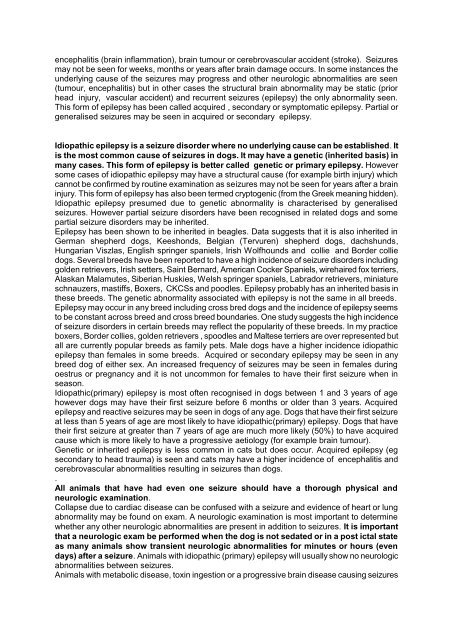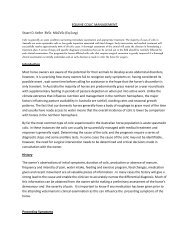Seizure disorders in dogs - Australian Veterinary Association
Seizure disorders in dogs - Australian Veterinary Association
Seizure disorders in dogs - Australian Veterinary Association
Create successful ePaper yourself
Turn your PDF publications into a flip-book with our unique Google optimized e-Paper software.
encephalitis (bra<strong>in</strong> <strong>in</strong>flammation), bra<strong>in</strong> tumour or cerebrovascular accident (stroke). <strong>Seizure</strong>smay not be seen for weeks, months or years after bra<strong>in</strong> damage occurs. In some <strong>in</strong>stances theunderly<strong>in</strong>g cause of the seizures may progress and other neurologic abnormalities are seen(tumour, encephalitis) but <strong>in</strong> other cases the structural bra<strong>in</strong> abnormality may be static (priorhead <strong>in</strong>jury, vascular accident) and recurrent seizures (epilepsy) the only abnormality seen.This form of epilepsy has been called acquired , secondary or symptomatic epilepsy. Partial orgeneralised seizures may be seen <strong>in</strong> acquired or secondary epilepsy.Idiopathic epilepsy is a seizure disorder where no underly<strong>in</strong>g cause can be established. Itis the most common cause of seizures <strong>in</strong> <strong>dogs</strong>. It may have a genetic (<strong>in</strong>herited basis) <strong>in</strong>many cases. This form of epilepsy is better called genetic or primary epilepsy. Howeversome cases of idiopathic epilepsy may have a structural cause (for example birth <strong>in</strong>jury) whichcannot be confirmed by rout<strong>in</strong>e exam<strong>in</strong>ation as seizures may not be seen for years after a bra<strong>in</strong><strong>in</strong>jury. This form of epilepsy has also been termed cryptogenic (from the Greek mean<strong>in</strong>g hidden).Idiopathic epilepsy presumed due to genetic abnormality is characterised by generalisedseizures. However partial seizure <strong>disorders</strong> have been recognised <strong>in</strong> related <strong>dogs</strong> and somepartial seizure <strong>disorders</strong> may be <strong>in</strong>herited.Epilepsy has been shown to be <strong>in</strong>herited <strong>in</strong> beagles. Data suggests that it is also <strong>in</strong>herited <strong>in</strong>German shepherd <strong>dogs</strong>, Keeshonds, Belgian (Tervuren) shepherd <strong>dogs</strong>, dachshunds,Hungarian Viszlas, English spr<strong>in</strong>ger spaniels, Irish Wolfhounds and collie and Border collie<strong>dogs</strong>. Several breeds have been reported to have a high <strong>in</strong>cidence of seizure <strong>disorders</strong> <strong>in</strong>clud<strong>in</strong>ggolden retrievers, Irish setters, Sa<strong>in</strong>t Bernard, American Cocker Spaniels, wirehaired fox terriers,Alaskan Malamutes, Siberian Huskies, Welsh spr<strong>in</strong>ger spaniels, Labrador retrievers, m<strong>in</strong>iatureschnauzers, mastiffs, Boxers, CKCSs and poodles. Epilepsy probably has an <strong>in</strong>herited basis <strong>in</strong>these breeds. The genetic abnormality associated with epilepsy is not the same <strong>in</strong> all breeds.Epilepsy may occur <strong>in</strong> any breed <strong>in</strong>clud<strong>in</strong>g cross bred <strong>dogs</strong> and the <strong>in</strong>cidence of epilepsy seemsto be constant across breed and cross breed boundaries. One study suggests the high <strong>in</strong>cidenceof seizure <strong>disorders</strong> <strong>in</strong> certa<strong>in</strong> breeds may reflect the popularity of these breeds. In my practiceboxers, Border collies, golden retrievers , spoodles and Maltese terriers are over represented butall are currently popular breeds as family pets. Male <strong>dogs</strong> have a higher <strong>in</strong>cidence idiopathicepilepsy than females <strong>in</strong> some breeds. Acquired or secondary epilepsy may be seen <strong>in</strong> anybreed dog of either sex. An <strong>in</strong>creased frequency of seizures may be seen <strong>in</strong> females dur<strong>in</strong>goestrus or pregnancy and it is not uncommon for females to have their first seizure when <strong>in</strong>season.Idiopathic(primary) epilepsy is most often recognised <strong>in</strong> <strong>dogs</strong> between 1 and 3 years of agehowever <strong>dogs</strong> may have their first seizure before 6 months or older than 3 years. Acquiredepilepsy and reactive seizures may be seen <strong>in</strong> <strong>dogs</strong> of any age. Dogs that have their first seizureat less than 5 years of age are most likely to have idiopathic(primary) epilepsy. Dogs that havetheir first seizure at greater than 7 years of age are much more likely (50%) to have acquiredcause which is more likely to have a progressive aetiology (for example bra<strong>in</strong> tumour).Genetic or <strong>in</strong>herited epilepsy is less common <strong>in</strong> cats but does occur. Acquired epilepsy (egsecondary to head trauma) is seen and cats may have a higher <strong>in</strong>cidence of encephalitis andcerebrovascular abnormalities result<strong>in</strong>g <strong>in</strong> seizures than <strong>dogs</strong>..All animals that have had even one seizure should have a thorough physical andneurologic exam<strong>in</strong>ation.Collapse due to cardiac disease can be confused with a seizure and evidence of heart or lungabnormality may be found on exam. A neurologic exam<strong>in</strong>ation is most important to determ<strong>in</strong>ewhether any other neurologic abnormalities are present <strong>in</strong> addition to seizures. It is importantthat a neurologic exam be performed when the dog is not sedated or <strong>in</strong> a post ictal stateas many animals show transient neurologic abnormalities for m<strong>in</strong>utes or hours (evendays) after a seizure. Animals with idiopathic (primary) epilepsy will usually show no neurologicabnormalities between seizures.Animals with metabolic disease, tox<strong>in</strong> <strong>in</strong>gestion or a progressive bra<strong>in</strong> disease caus<strong>in</strong>g seizures

















